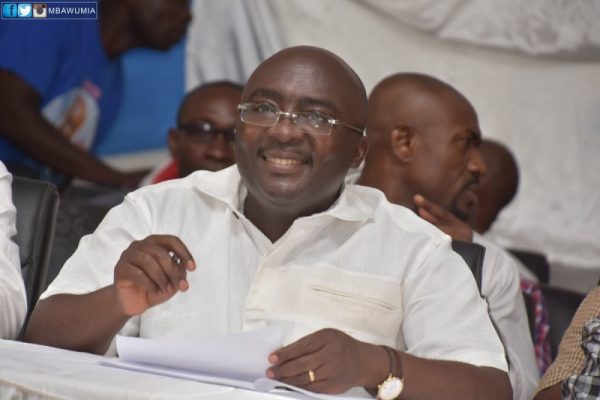‘70% contracts to go to locals’ – Veep
- Posted on
- Comment
 Seventy per cent of government-funded projects are to be offered to local entities as part of initiatives to build a vibrant economy.
Seventy per cent of government-funded projects are to be offered to local entities as part of initiatives to build a vibrant economy.
The Vice-President, Dr Mahamudu Bawumia, who announced this in Accra yesterday, said that would help local companies to build their capacities and create an enabling environment for them to thrive and own the local economy, while helping to make it robust.
“Ghana must play a lead role in building its economy. Our laws must, therefore, support the private sector and local entities to help build a robust and vibrant economy deserving of the country 60 years after independence,” he said.
In a video message to open the sixth Ghana Economic Forum, Dr Bawumia, explained that the vibrant economy the government sought to build was founded on investments, Ghanaians and a thriving private sector, instead of aid and dependency.
“The government has a responsibility to ensure that Ghanaian businesses are able to grow to be able to own a controlling stake in Ghana’s $43-billion economy, “he stressed.
The two-day forum, organised by the Business and Financial Times, is on the theme: “Building the Ghanaian economy, 60 years after independence.”
It has provided a platform for economic experts, government officials and business owners to dialogue and come up with practical solutions to the challenges facing the economy.
Discussions at the forum are focused on agriculture, energy, entrepreneurship and innovation, financial management reforms and other critical issues to national development.
Macroeconomic stability
As part of the framework for building a vibrant and robust economy, Dr Bawumia underscored the need for macroeconomic stability to attract the needed local and international investment.
He said to achieve that stability, the government had put in place policies to cut taxes to reduce the burden on local businesses and the citizenry.
Additionally, he said, the government was pursuing a rigorous reduction in the fiscal deficit, adding: “Currently, the interest rate has been reduced from 9.3 to 6.3 per cent and is expected to further reduce to between three and 3.5 per cent in 2018.
Dr Bawumia also said the government would ensure that credit facilities were made accessible to the public, describing credit accessibility as key to economic development.
He expressed the hope that the outcome of the deliberations would be concrete enough to inform policy decisions in building the economy.
Collaboration
In her welcome address, the Chief Executive Officer of the Business and Financial Times, Dr Edith Dankwa, underscored the need for all stakeholders to come together and build the economy to an appreciable level.
She noted that although all business owners and other economic stakeholders had their respective interests, it was time for all to come together for greater collaboration focused on building a Ghanaian economy owned by local entities, instead of pursuing just their individual business development interests.
She was of the opinion that Ghanaian businesses would require a level playing field to be able to reach their full potential to facilitate the collaboration needed to build the economy and called on the government to provide that level playing field.
Public-private partnership
Making a contribution, the Senior Minister, Mr Yaw Osafo Maafo, said the government would provide the enabling environment for the private sector to flourish to be able to contribute to national development and create the needed jobs,” he said.
On industrial development, Mr Osafo Maafo said the government intended to accelerate industrial development through shifting the focus of economic management from taxation to production.
-Graphic






 (Selorm) |
(Selorm) |  (Nana Kwesi)
(Nana Kwesi)